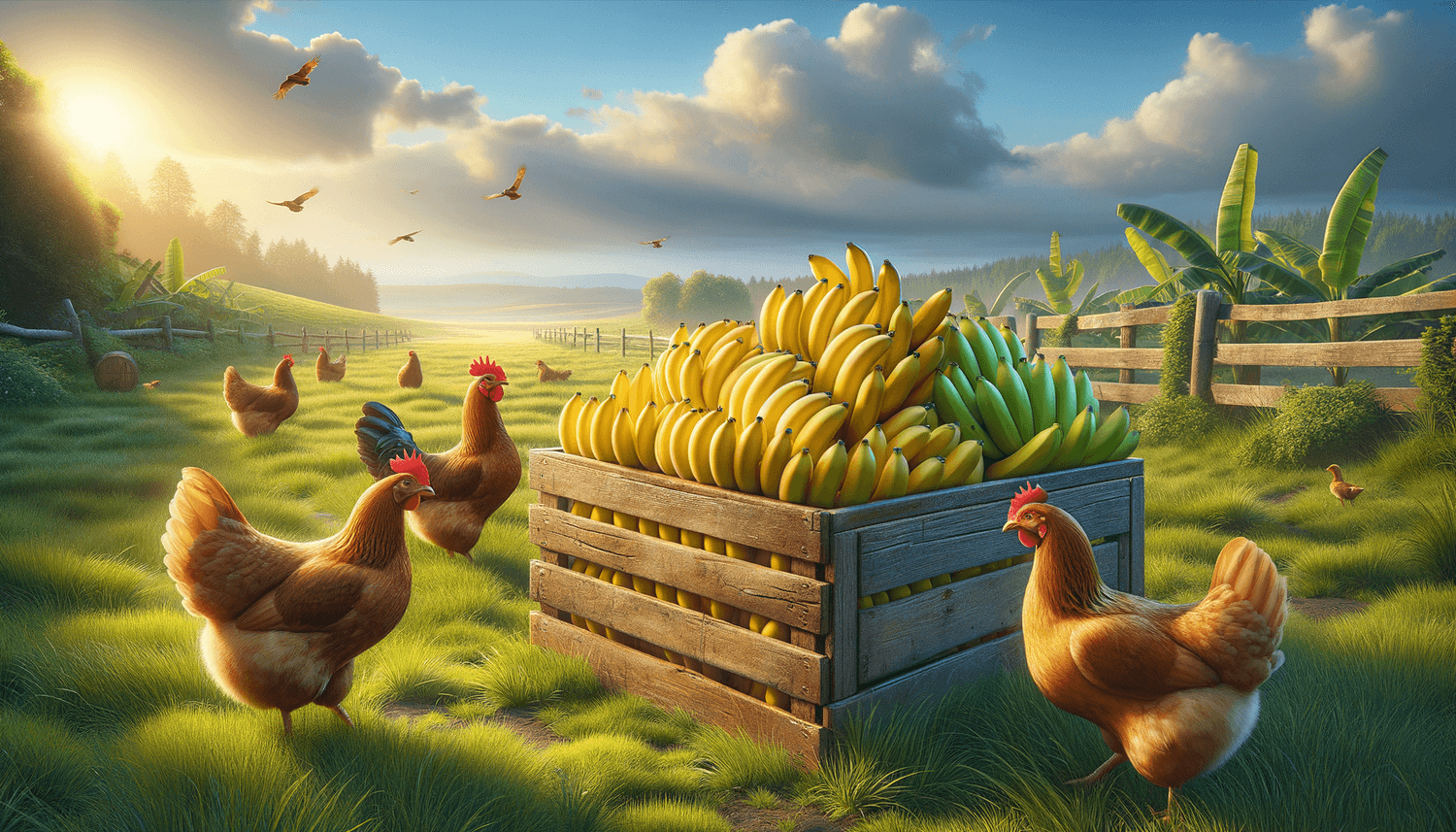As backyard chicken enthusiasts, we often find ourselves pondering the great mysteries of life, such as: “Can chickens eat bananas?” Well, saddle up your roosters and peel back your curiosity, because we’re about to embark on a fun-filled journey into the world of chickens and bananas! This blog post will answer that pressing question, explore the importance of a balanced diet for your feathery friends, and dive into the nutritional benefits and risks of bananas. Further, we’ll walk you through the tips and tricks of preparing everyone’s favorite yellow fruit (sorry, yellow bell peppers) for your fluffy hens and rambunctious roosters. So, let’s get crackin’!
Can chickens eat bananas?
Yes, chickens can safely eat bananas! This tasty and nutritious fruit is a delightful treat for your feathered friends. However, it is essential to remember that moderation is key, as offering too many bananas can lead to excessive sugar intake and disrupt their balanced diet. So, go ahead and give your chickens an occasional banana treat!
Chickens need a balanced diet, just like humans
Just as we humans require a balanced diet for good health, our backyard chickens also need a balanced and nutrient-dense diet to stay in tip-top shape. A chicken’s diet should primarily consist of a high-quality chicken feed, which provides the essential vitamins, minerals, and protein that they need to be happy and healthy. Chicken feed should make up around 80-90% of their overall diet to ensure they receive all the crucial nutrients.
The remaining 10-20% of a chicken’s diet can consist of a variety of treats like fruits, vegetables, and other healthy goodies. These can not only serve as a delectable break from their regular feed but also provide added nutrients and vitamins. It’s important, however, to keep treats as, well, treats—don’t let them consume too much, as it could unbalance their diet and lead to nutritional deficiencies. So, while bananas can be an exciting and healthy treat for your chickens, remember that maintaining a balanced diet with the right proportion of chicken feed is key for their overall well-being.
Nutritional value of bananas for chickens.
Bananas are not only delicious but also provide an array of nutrients that can benefit your backyard chickens. One of the primary advantages of feeding bananas to your chickens is their vitamin content. Bananas are rich in vitamins A, B6, and C, which are essential for maintaining healthy skin, vision, immune systems, and nerve functions in your feathered friends. Providing these vitamins in their treat options is a great way to supplement their health alongside their regular chicken feed.
In addition to vitamins, bananas also contain significant amounts of minerals such as potassium and magnesium. Potassium helps regulate fluid balance, aids in muscle function, and plays a vital role in nerve signaling, while magnesium supports bone health and muscle function. Hydration is another benefit that bananas can offer your chickens, as they have a high water content, which can help during hot summer days to prevent dehydration.
Bananas are also rich in fiber, which can support healthy digestion and nutrient absorption in chickens. However, it is essential to note that bananas do come with sugar, so moderation is crucial when including them as a treat option. Providing bananas occasionally as a treat will help your chickens reap these impressive nutritional benefits without overloading them with sugar, which could potentially lead to digestive disturbances or unbalanced nutrition.
Nutrition table of bananas for chickens.
| Information | Description |
|---|---|
| Nutritional Value | Rich in vitamins A, B6, and C, potassium, magnesium, and fiber. |
| Suggested Serving Size | Small pieces, making up 10-20% of their diet. |
| Safe Feeding Practices | Moderation is key, avoid excessive sugar intake by limiting banana treats. |
| Preparation | Peel the banana, cut into small pieces or mash. |
| Potential Risks | Too much sugar can disrupt balanced nutrition, peel may pose a choking hazard. |
| Hydration | High water content helps keep chickens hydrated, especially in hot weather. |
| Digestion | Fiber content supports healthy digestion and nutrient absorption. |
| Seasonal Availability | Bananas are typically available year-round. |
| Other Benefits | Boosts overall immune health and supports muscle and bone health. |
Preparing bananas for your chickens
Before feeding bananas to your chickens, it’s crucial to prepare them properly. The first step is to remove the peel, as it can be difficult for your chickens to digest and may cause choking. Once peeled, you can either cut the banana into small pieces or mash it, depending on your chickens’ preferences. Providing the treat in an easily consumable form will help your chickens enjoy their banana snack without any worries.
Avoid overripe or moldy bananas
While chickens tend to enjoy bananas of varying ripeness, it’s essential to avoid offering overripe or moldy options. Rotten or moldy bananas can harbor harmful bacteria and toxins that could put your chickens at risk for illness. Make sure to check the quality of your bananas before feeding them to your backyard flock, just as you would for yourself.
Alternatives to bananas
If you’re looking for variety in your chickens’ diet or find that your flock isn’t fond of bananas, there are many other tasty and nutritious fruits and vegetables you can try. Some popular options include strawberries, blueberries, watermelon, and leafy greens like kale or spinach. Remember to provide these treats in moderation to maintain a balanced diet for your hens and roosters, and take note of your chickens’ preferences to serve the best-suited snacks.
In conclusion, bananas can be a delightful and nutritious treat option for your backyard chickens. By feeding them in moderation and preparing them correctly, you can maintain a balanced diet while offering an enjoyable and healthy snack for your flock.

















